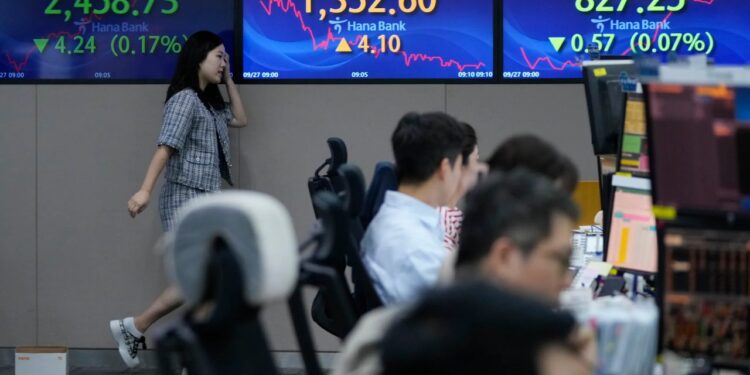Asian markets opened cautiously on Monday, with mixed results across major bourses as investors weighed global political tensions and awaited fresh economic indicators from the United States. The broader mood remained one of watchful restraint following last week’s dramatic developments in the Middle East.
Tokyo’s Nikkei 225 opened marginally higher before slipping into negative territory, pressured by profit-taking and weakness in semiconductor stocks. Meanwhile, Hong Kong’s Hang Seng index edged up by 0.3% in early trading, driven by tech and consumer shares, while mainland Chinese markets saw modest gains in Shanghai and Shenzhen, reflecting a mild recovery in investor confidence after recent policy signals from Beijing.
South Korea’s Kospi slipped slightly, with automakers and battery producers underperforming, while Australia’s ASX 200 remained flat, buoyed by commodity-linked sectors but weighed down by banking stocks. Overall, volumes were thin as many traders kept one eye on ongoing developments in the Iran-Israel conflict and on central bank commentary from the US.
The muted performance in Asia followed a volatile week globally, marked by the US military’s airstrikes on Iranian nuclear facilities and sharp reactions from global leaders. Investors are now treading carefully amid fears of broader conflict, higher oil prices, and disruptions to trade routes.
Looking ahead, attention is turning to Europe and the US for further direction. European futures suggest a flat to slightly higher open, with London’s FTSE 100 expected to gain mildly on energy and defence shares. However, traders remain cautious ahead of eurozone PMI data and any further signals on inflation and monetary policy from the European Central Bank.
In the US, markets are bracing for a week of key economic data, including personal consumption expenditures (PCE) inflation figures due Thursday. With the Federal Reserve maintaining a data-dependent stance, any surprise in inflation numbers could quickly shift expectations around future interest rate cuts. Wall Street is also digesting renewed political volatility, following the bipartisan reactions to the Iran airstrikes, which could influence defence spending and geopolitical risk sentiment.
Currency markets remained relatively stable, with the US dollar slightly firmer against the yen and the euro. Oil prices climbed modestly in early Asian trade, reflecting continued supply concerns, while gold remained near recent highs as investors sought safety.
As Monday unfolds, markets across Europe and the US will be tested by a delicate balance of economic signals and geopolitical developments. Volatility may remain elevated, especially if the situation in the Middle East escalates or if inflation surprises on the upside.
newshub finance



Recent Comments